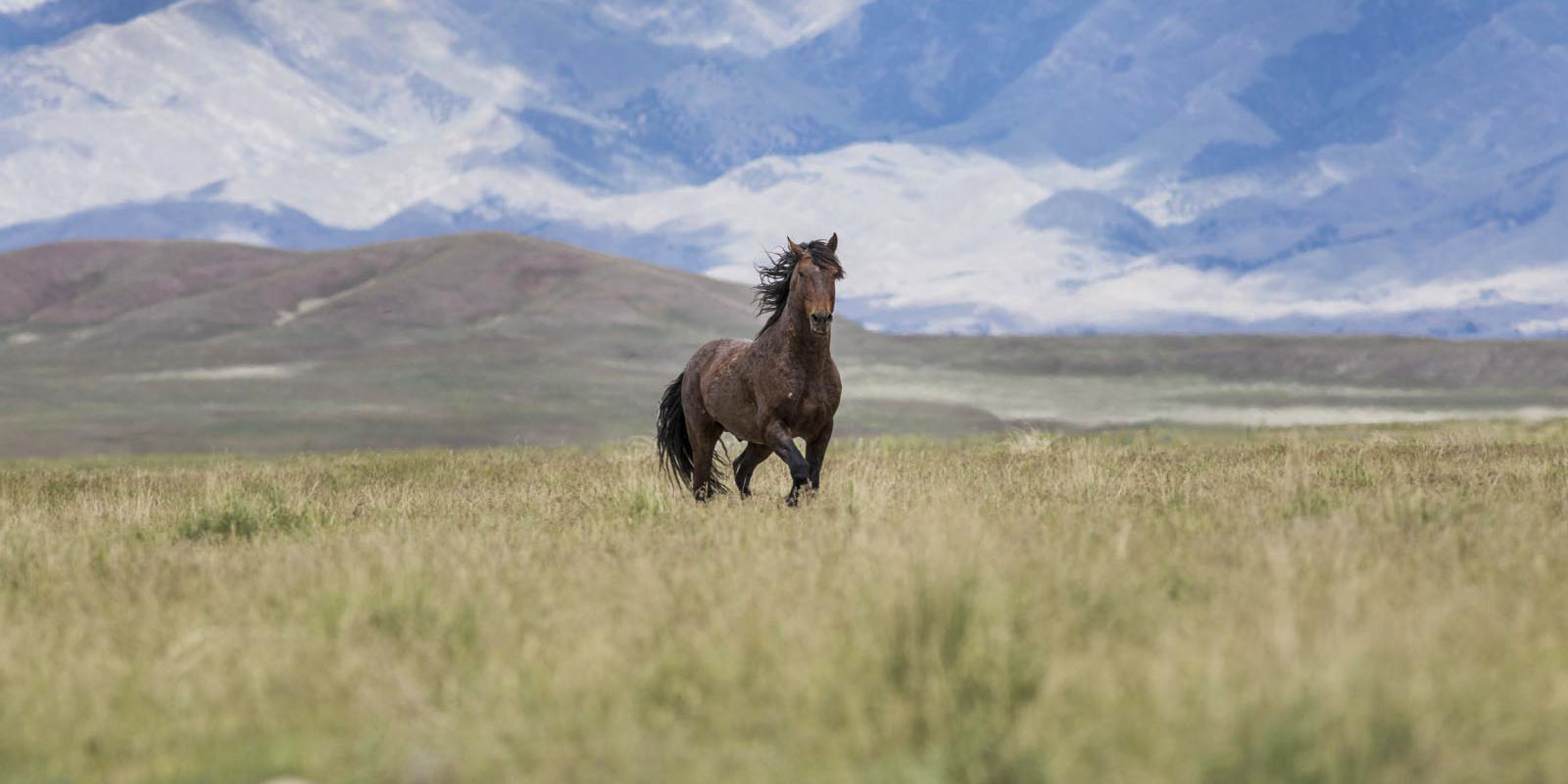An escaped mare whose owner says once marched in the Nevada Day parade in Carson City is now part of a legal fight to keep horses freely roaming the state’s Virginia Range.
Cynthia Ashe of Silver Springs filed suit late Monday in state court in Carson City because she says she’s worried her lost mare, Cece, could get swept up in a proposal by the Nevada Department of Agriculture to give up ownership of thousands of publicly owned horses living on the range.
According to the lawsuit, the horse, which Ashe identified as Cece, escaped her pen in 2016 and joined a band of free range horses that would be included in the proposed giveaway.
Ashe said if that happens not only would the Cece be in danger, it would violate her rights under state livestock laws.
“They can’t just give other people’s horses away,” Ashe said.
Nevada Department of Agriculture director Jim Barbee acknowledged the suit but wouldn’t comment on specifics.
“We have been consulting and will continue to consult with our Deputy Attorney General on the pending lawsuit,” Barbee said.
The lawsuit seeks to block the agriculture department from executing the giveaway plan the state’s Board of Agriculture approved in December.
The plan called for the state to publish a request for proposals seeking a non-profit, animal welfare group to take over ownership of nearly 3,000 publicly owned horses roaming the range.
After protests and appeals to Gov. Brian Sandoval failed to result in a reversal, opponents turned to the courts.
Ashe joined the suit with the American Wild Horse Campaign and funding from Lance Gilman, developer of the world’s largest industrial park that’s home to projects by Tesla, Google, Apple and other major firms.
The court filing alleges the plan would violate state law because it would transfer ownership of the horses en masse despite a legal requirement that says feral or estray horses “must be marked, branded or identified with an individual animal identification before any sale or placement …”
In addition to stepping on Ashe’s ownership rights, the plaintiffs say the horses that don’t have owners belong on the range where they serve as a living symbol of Nevada and western history.
“Just as you wouldn’t use Lake Tahoe or Ruby Lake for a sewage treatment plant, or allow condo development in the Valley of Fire, you can’t wipe out the Virginia Range Wild Horses,” attorney William Hake of the San Francisco law firm Wilson Elser Moskowitz Edelman & Dicker LLP, which represents the plaintiffs, said in a written statement. “That is what will happen if the state gives them away.”
The Virginia Range horses live similarly to wild horses that roam throughout Nevada and the west. But they’re legally distinct because they’re under state, not federal, control. As such, they’re not covered by federal laws and regulations that restrict roundups of horses for slaughter.
In 2013 and 2015 Nevada Department of Agriculture signed cooperative agreements with American Wild Horse Campaign under which the volunteer organization would manage the horses by rescuing the sick and injured, support adoption of the animals, administer birth control to mares and help to keep horses from roadways and other places where they could be a safety hazard.
The agreement fell apart in October with both the non-profit and the department accusing each other of failing to live up to the terms.
At the time the department said it was seeking another non-profit to enter a new management agreement. But that changed with the December vote to issue a request for proposals to give up state ownership altogether.
Horse advocates say, and state officials acknowledge, that if ownership were to transfer to a private party the state wouldn’t have authority to compel the new owner to keep the animals on the range or even prevent them from being sold for slaughter.
Fears over what could happen to the horses under private ownership are a large part of the motivation behind the lawsuit.
“Instead of living up to the commitment, the state wants to give these cherished horses away to a new owner, who will then will be legally allowed to round them up and send them to slaughter,” said Suzanne Roy, executive director of America’s Wild Horse Campaign.
Willis Lamm, a longtime horse advocate, volunteer and mentor to people who adopt wild horses, said Cece’s story started on the range in 2011.
Lamm said records show she was born near Fernley to a mother who couldn’t care for her and brought in as a rescue at about four weeks old.
Ashe, Lamm said, adopted her several months later and walked with her in the Nevada Day Parade. Photos show a colt Lamm identified as Cece wearing a red halter and American flag pattern ribbon walking side-by-side with Ashe.
He said adopted wild horses are a natural fit for the event because the animals are in integral part of Nevada’s history and culture.
“We get a warm reception there,” Lamm said. “They are Nevada’s horses, it is the Nevada Day parade.”
Ashe said in subsequent years she worked with Cece by walking with the animal and placing a light saddle on the its back.
The lawsuit states that at the time Cece went missing she, along with some geldings, had gotten out of their enclosure as a band of wild horses passed through.
The geldings, which were of no interest to the wild stallions, stayed close to home while Cece went off with the band.
“Since this incident, Ms. Ashe has searched for her mare, but to date has been unsuccessful in retrieving it, although the mare has been spotted on several occasions,” the lawsuit states.
Ashe said she agreed to participate in the lawsuit because she thinks the state’s plan would result in the demise of Virginia Range horses and she would like to be reunited with Cece.
“I don’t want to see any of the horses destroyed, and I for sure don’t want to see my horse sold to somebody,” Ashe said. “She is worth a million dollars to me, not to anybody else.”
The lawsuit, which lists Ashe and the American Wild Horse Campaign as plaintiffs against the Nevada Department of Agriculture and Nevada Board of Agriculture, is filed in First Judicial District Court in Carson City.


